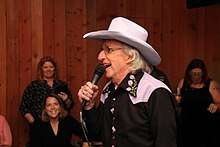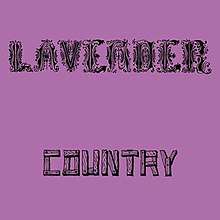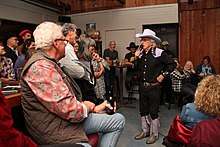Lavender Country
Lavender Country is an American country music band formed in 1972, whose self-titled 1973 album is the first known gay-themed album in country music history.[1]

Lavender Country | |
|---|---|
 The cover art of the Lavender Country album | |
| Background information | |
| Origin | Seattle, Washington, United States |
| Genres | Country |
| Years active | 1972–1976, 2000, 2014–present |
| Labels | Gay Community Social Services of Seattle, Paradise of Bachelors |
| Past members | Patrick Haggerty Michael Carr Eve Morris Robert Hammerstrom |
Based in Seattle, Washington, the band originally consisted of lead singer and guitarist Patrick Haggerty, keyboardist Michael Carr, singer and fiddler Eve Morris and guitarist Robert Hammerstrom (the only heterosexual member).[2]
Background
Haggerty was born on September 27, 1944[1] and raised on a dairy farm near Port Angeles, Washington.[3] After college he joined the Peace Corps, but was discharged in 1966 for being gay.[1] He later became an artist and an activist with the local chapter of the Gay Liberation Front after moving to Seattle to pursue graduate studies at the University of Washington.[1]
Album
Their eponymous 1973 album was funded and released by Gay Community Social Services of Seattle,[4] with funding and production assistance from activist Faygele Ben-Miriam.[5] Just 1,000 copies of the album were pressed at the time of its original release.[6] The band performed at the first Seattle Pride event in 1974,[7] and performed at numerous pride and other LGBT events throughout Washington, Oregon and California[2] until their dissolution in 1976.[1] Shan Ottey, a DJ for Seattle radio station KRAB, played the band's song "Cryin' These Cocksucking Tears" on the air in 1973, resulting in Ottey's dismissal from the station.[8]
Post-breakup activity
After disbanding Lavender Country in 1976, Haggerty ran two unsuccessful campaigns for political office, once for Seattle City Council and once as an independent candidate for a seat in the Washington House of Representatives,[8] and continued to work as a gay rights and anti-racism activist.[8]
Revival
In 2000, the Journal of Country Music published an article on gay country musicians, focusing in large part on Haggerty and Lavender Country.[1] As a result of the renewed attention, the album was rereleased on CD in December 1999, and in 2000 the band released a five-song EP, Lavender Country Revisited, which featured three rerecordings of songs from the original album and two new songs.[9] The band reunited briefly in 2000, performing the album in its entirety at Seattle's Broadway Performance Hall in January 2000,[10] and at that year's Seattle Pride.[9] In addition, the album was archived at the Country Music Hall of Fame by former Journal of Country Music editor Chris Dickinson.[11]

Their song "Cryin' These Cocksucking Tears" was included in the 2012 compilation album Strong Love: Songs of Gay Liberation 1972–1981.[12] The 1973 album was rereleased on independent label Paradise of Bachelors in 2014,[13] and the band have played several reunion shows in 2014 to support the reissue.[14]
Haggerty recorded a story for StoryCorps about coming out to his father in 1959, which was adapted into the animated short film The Saint of Dry Creek in 2015.[15] In 2016, director Dan Taberski directed a short film titled These C*cksucking Tears which starred Haggerty and told the story of his life and career.[16]
In 2017 and again in 2019 Robert Dekkers' Post:Ballet company staged a modern ballet performance of Lavender Country, choreographed by Vanessa Thiessen and performed at the Z Space theater in San Francisco with Patrick Haggerty performing live with a new Lavender Country band featuring guitarists Dennis Fortin and Mark Newstetter, violinist Calvin K. Murasaki, Mya Byrne on bass, James Wilson on piano and Joyce Baker on drums.[17]
In 2019 the band released Blackberry Rose and Other Songs and Sorrows, their first full-length album of new material since 1973.[18][19]
In 2020, Haggerty was featured in a version of Trixie Mattel's reprise of "I Can't Shake the Stranger Out of You", titled "Stranger" on her album Barbara.
Discography
- 1973 – Lavender Country (Tracks: "Come Out Singin'", "Gypsy John", "Waltzing Will Trilogy", "Georgie Pie", "Cryin' These Cocksucking Tears", "Back in the Closet Again", "I Can't Shake the Stranger Out of You", "To a Woman", "Straight White Patterns", "Lavender Country".)
- 1999 – Lavender Country (reissue)
- 2000 – Lavender Country Revisited (Tracks: "Come Out Singing", "Gay Bar Blues", "Clara Fraser vs. Seattle City Light", "Lavender Country", "I Can't Shake the Stranger Out of You".)
- 2014 – Lavender Country (reissue)
- 2019 – Blackberry Rose and Other Songs and Sorrows
Notes
- Dickinson, Chris (2000). "Country Undetectable: Gay Artists in Country Music". Journal of Country Music. XXI (1): 28–39. Archived from the original on April 10, 2009. Retrieved 4 August 2009.CS1 maint: unfit url (link)
- "The First Openly Gay Country Singer....Was Patrick Haggerty, in 1973". Queer Music Heritage, July 10, 2013.
- "Country Music" Archived 2013-07-14 at the Wayback Machine. glbtq.com, 2002.
- "Never Heard of 'Em: Lavender Country". The Stranger, June 22, 2012.
- Carole Beers (June 7, 2000). "Faygele benMiriam crusaded for rights". The Seattle Times.
- "“These C*cksucking Tears”: The Story Behind The First Gay Country Album". NewNowNext, October 14, 2016.
- "More doors open to gays today". Seattle Post-Intelligencer, June 24, 2004.
- "40 Years Later, Patrick Haggerty’s Gay Country Album Gets a Proper Release". Seattle Weekly, March 18, 2014.
- "Gay community resources, organizations and events" Archived 2013-07-23 at Archive.today. Kitsap Sun, June 25, 2000.
- Patrick Haggerty at Stonewall Society.
- Paulson, Don (16 January 2009). "Gay History: Lavender Country". Seattle Gay News. Retrieved 4 August 2009.
- "Strong Love: Songs of Gay Liberation 1972–1981". Gay News Network, May 8, 2012.
- "Country music's gay stars: 'We're still kicking down the closet door'". The Guardian, April 10, 2014.
- "Interviews: Lavender Country". Pitchfork, April 8, 2014.
- A Farmer’s Powerful Advice to His Gay Son in 1959: “Don’t Sneak.”. Slate, October 12, 2015.
- "Gay Country Superstar Patrick Haggerty Is Still 'Cryin' Those Cocksucking Tears'". Vice, July 29, 2016.
- Aimée Ts'ao, "‘Lavender Country’: Ballet inspired by first gay country album returns to SF". The Mercury News, April 22, 2019.
- Carey, Leigh Ann (June 18, 2019). "Patrick Haggerty, Country Music's Gay Pioneer, Is Back With New Music After 47 Years". Slate Magazine. Retrieved June 20, 2019.
- Sodomsky, Sam (2019-06-30). "Lavender Country, Gay Country Pioneer, Releases First New Album in 46 Years: Listen". Pitchfork. Retrieved 2020-02-06.
External links
| Wikimedia Commons has media related to Lavender Country. |
- Official website
- "Out west: the return of Country music’s first gay artist" from the Sonoma Valley Sun
- Lavender Country at Paradise of Bachelors